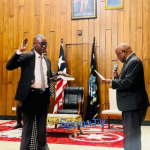𝐒𝐔𝐒𝐏𝐄𝐍𝐃𝐄𝐃 𝐂𝐄𝐍𝐓𝐑𝐀𝐋 𝐁𝐀𝐍𝐊 of Liberia (CBL) Governor, J. Aloysius Tarlue, has taken the Executive branch, through the Ministry of Justice, to the Supreme Court, requesting that the court places a stay order on President Boakai’s decision because it is illegal and contrary to what normally obtains in such cases and circumstances. Tarlue also prayed that the court orders his reinstatement as Executive Governor of the CBL, with all his salary, emoluments and all other rights as though he was never removed from office by President Boakai, as the President’s decision is tantamount to depriving him of his property right and right to work without due process.
𝐈𝐍 𝐀 𝐏𝐄𝐓𝐈𝐓𝐈𝐎𝐍 for a writ of prohibition filed to the Supreme Court against the Executive Branch of government (respondent), Governor Tarlue (petitioner) stated that he had a definite term to serve and could not be dismissed by the President of Liberia or removed from performing his function except by impeachment by the National Legislature, noting that his suspension is not supported by the law controlling the removal of the Executive Governor of the Central Bank; hence, it is arbitrary, inconsistent with governance by the rule of law, and constitutes a willful violation of the Amended and Restated Act Establishing the CBL without any legal justification.
𝐇𝐄 𝐀𝐑𝐆𝐔𝐄𝐃 𝐓𝐇𝐀𝐓 the Amended and Restated Act Establishing the Central Bank of Liberia (1999) provides for the removal of the Executive Governor only by impeachment by the National Legislature, and contains no provision for the suspension of the Executive Governor by the President of the Republic of Liberia.
𝐓𝐇𝐄 “𝐒𝐔𝐒𝐏𝐄𝐍𝐃𝐄𝐃” 𝐂𝐁𝐋 Governor contended that, if President Boakai is not prohibited from removing from office officials in the three branches of government with tenures protected by law or whose removal can only be by impeachment or other legal procedures and for specifically stated legal grounds, such arbitrary action may become a precedent for the removal of other protected officials, including members of the Supreme Court, through “suspension”, thereby making the Executive Branch a superior branch of government, contrary to the intent of the framers of the Constitution and the people of Liberia.
𝐓𝐀𝐑𝐋𝐔𝐄 𝐄𝐌𝐏𝐇𝐀𝐒𝐈𝐙𝐄𝐃 𝐓𝐇𝐀𝐓 the word “suspension” constitutes a slippery slope for all tenure officials in the three branches of government that needs to be made unavailable to the Executive branch of government by the Supreme Court; otherwise, Liberia will gradually slip into dictatorship by default of the court and through the tricks and chicanery of the Executive branch, given that the word “suspension” as used by the Executive for the removal of tenure officials of government is, conceptually, a clever attempt to circumvent the law.
𝐒𝐄𝐂𝐓𝐈𝐎𝐍 𝟏𝟒.𝟒 𝐎𝐅 the Amended CBL Act says, “The Executive Governor, Non-Executive Governor or Deputy Governors shall be removed by the Senate from office only upon a bill of impeachment submitted by the House of Representatives based on any of the following grounds: gross breach of duty, misconduct in office, conviction of a felony, declared bankrupt, disqualified or suspended from practicing his profession in Liberia by order of a competent authority made in respect of him personally, and adjudged or otherwise declared to be a person of unsound mind or incapable of properly performing the functions of the office owing to ill-health.”







